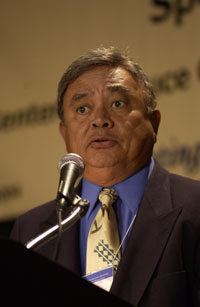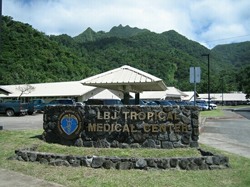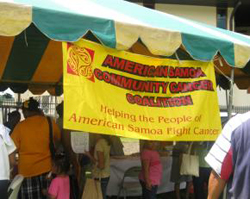By Trisha Comsti
March 1, 2010

Dr. Victor Tofaeono speaking at NCI's Community Networks Cancer Health Disparities Summit in 2005 in Bethesda, Md. (Bill Branson, NIH Photographer)
The Problem: "What is the point of cancer screening if you can't get treatment for what you're diagnosed with?" is a question Victor Tofaeono, M.D., often hears from patients in American Samoa, where cancer is the second-leading cause of death and 60 percent of the population lives below the federal poverty line. According to the investigators, American Samoans face a lack of access to quality health care, cultural misperceptions about cancer and its causes, and too few Samoan health care professionals.
The American Samoan Community Cancer Network, led by Dr. Tofaeono and program director Luana Scanlan, has been combating these issues head on for the past five years with a grant from the National Cancer Institute's Center to Reduce Cancer Health Disparities. The network is a partnership between the Lyndon B. Johnson Tropical Medical Center, the American Samoa Community College, and the American Samoa Department of Health.
LBJ Tropical Medical Center, the only hospital in American Samoa, provides services ranging from pediatric care to surgical procedures, and it houses a clinical laboratory and diagnostic imaging equipment. But Samoans have found the medical system to be uncoordinated, fragmented and often confusing to navigate, causing citizens to refrain from seeking out and receiving needed medical care.

Lyndon B. Johnson Tropical Medical Center, American Samoa. (This photograph originally appeared on the www.asmca.org website. Reposted with permission.)
"We need to vigorously address the disparity [in cancer outcomes] among Samoans as a result of lack of access to quality health care," said Dr. Tofaeono. "Without access to care, our efforts to improve screening and early diagnosis of cancer are doomed to fail."
Finding a Solution: Dr. Tofaeono and Ms. Scanlan are addressing the problem of access to care with funding from the American Recovery and Reinvestment Act (ARRA). The ARRA grant is supporting a pilot program that will empower Samoan citizens to take control of their health. The program has created a "patient navigator" position to help Samoans successfully run the maze of available medical services. This is part of a National Cancer Institute Patient Navigator Research Program designed to serve minority and underserved cancer patients by reducing the time to delivery of standard cancer services, diagnosis and treatment. The new patient navigator requires a master's degree in social work and has initially focused on helping women with breast cancer gain access to needed services, ranging from diagnosis and treatment to palliative care and end-of-life issues.

Patient Navigator, Ms. Salilo Julia Foifua, M.S.W.
In addition to the Patient Navigator Research Program, the American Samoa Community Cancer Network will continue its successful work through the National Cancer Institute's Center to Reduce Cancer Health Disparities by initiating a program in cancer research and training to develop indigenous Samoan researchers. The project has worked to promote cancer awareness through education programs that are respectful of Samoan cultural beliefs, practices and customs. This includes conducting village focus groups to understand the community's perceptions about cancer and creating programs to encourage indigenous Samoans to become researchers and health care professionals themselves. The network is also working to get more Samoans involved in clinical trials, enroll eligible citizens in the Medicaid program, and increase the number of grants addressing cancer in American Samoa.
How This Funding Helps: ARRA funds are creating several new jobs, including the new patient navigator position as well as coordinator and analyst positions associated with the project. "This project would not be possible without the ARRA funding. It covers the cost of salaries, office space and supplies, and transportation. ARRA funding is needed, beneficial and greatly appreciated," said Ms. Scanlan.
Over the Next Two Years … Dr. Tofaeono and Ms. Scanlan hope that the patient navigator will become a vital and permanent component of Samoan medical care. Because the patient navigator will identify the obstacles that citizens face in accessing health care, the program will streamline the referral process at LBJ Tropical Medical Center; physicians will be able to know their patients are following up on recommended treatments and procedures.

American Samoa Community Cancer Coalition banner: "Helping the People of American Samoa Fight Cancer" (This photograph originally appeared on the www.asccancercoalition.org website. Reposted with permission.)
Long-Term Impact: The American Samoan Community Cancer Network's overall goal is to reduce cancer incidence and mortality over the next decade. The network also hopes to eventually expand patient navigation services to include all patients diagnosed with cancer as well as patients affected by other chronic noncommunicable diseases such as diabetes, hypertension, renal disease and cardiovascular disease.
Recovery Act Investment: This project, titled "American Samoa Community Cancer Network," received $111,068 from the National Cancer Institute in fiscal 2009.